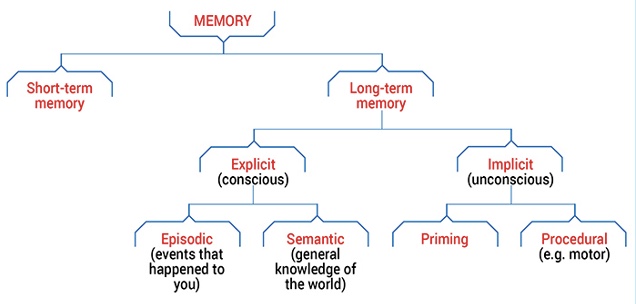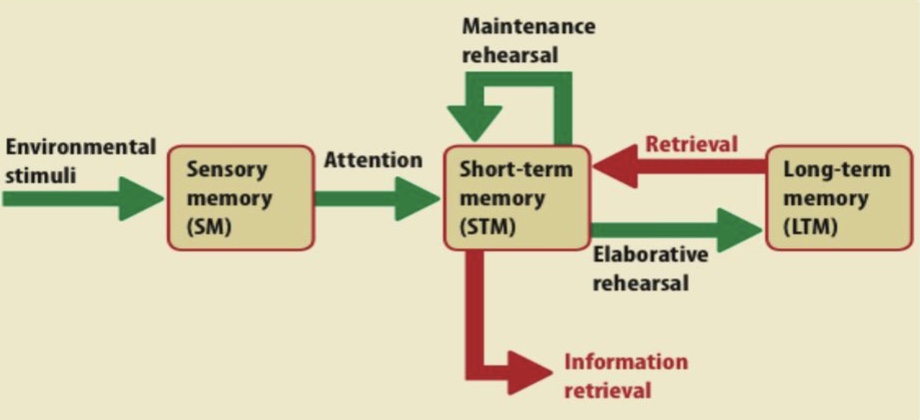Cognitive Approach - IB Psychology SL
1/19
Earn XP
Description and Tags
Paper 1 - Cognitive Approach
Name | Mastery | Learn | Test | Matching | Spaced | Call with Kai |
|---|
No analytics yet
Send a link to your students to track their progress
20 Terms
The Cognitive Model

Define ‘cognitive processing’
Refers to several tasks the mind does continuously, which are procedures in charge of processing all the information we receive from the environment
Define ‘cognition’
Refers to the mental processes involved in gaining knowledge and comprehension
What are the base cognitive processes?
Perception
Sensation
Attention
Thinking
Imagination
Memory
Learning
What are the advanced cognitive processes?
Creativity
Problem solving
Define ‘memory’
‘Memory’ refers to the process by which information is encoded, stored and retrieved

What is declarative memory?
Memory of facts or events, and refers to memories that can be consciously recalled
What are the two subsets of declarative memory?
Episodic memory: contains memories of specific events that have occurred at a given time or in a given time
Semantic memory: contains general knowledge of facts and people, for example concepts and schemas, and is not linked to time and place
What is procedural memory?
The unconscious memory of skills and how to do things
Proposed by Atkinson and Shiffrin (1968)

Sensory Memory / Register (SM) - MSM
Capacity? Duration? Condition for transferral?
Doesn’t process information - detects it and holds it until either transferred to the STM or lost
Capacity: limited by our perception
Duration: Iconic (visual): around 1 second, echoic (sound): around 4-5 secs
Condition for information to be passed to STM: Stimuli has to be paid attention to, else information decays to make way for new information
Short term memory (STM) - MSM
Capacity? Duration? Condition for transferral? Displacement?
Capacity: 5-9 chunks; Miller discovered the magic number of 7 ± chunks → breaking things down into chunks make them easier to remember
Duration: 15-30 secs
Condition for information to move from STM to LTM: Rehearsal:
Maintenance rehearsal: The straight repeating of information to remember it. Keeps it in STM for a short period of time
Elaborative rehearsal: Connects new information with information you already know, so creates a memorable, personalised association with the new piece of information. Maintains the information in LTM.
Displacement: Information in the STM is displaced by new information when your attention is taken away from the information in STM.
Long term memory (LTM) - MSM
Capacity? Duration? Condition for information retrieval?
Capacity: Unlimited, but not all information is easily retrievable
Duration: Unlimited
Condition for information to be retrieved: Information has to be moved from LTM to STM.
How is the Serial Position Effect support for MSM? (Glanzer and Cunitz (1966))
Primary effect - time for rehearsal of those words allow them to move to the long-term store
Recency effect - words at the end of the list are still in STM
The words in the middle of the list did not have enough time to be rehearsed, so were displaced from STM
Research support for MSM - Glanzer and Cunitz (1966)
APFC?
Aim: To examine whether the position of words influences the recall (primary and recency effects) and to investigate the existence of short-term memory and long-term memory as two separate memory stores.
Procedure:
240 US Army-enlisted males were presented lists of words, one at a time. They were asked to recall the words in any order they liked (free recall)
IV: Presence or absence of distractor task
DV: Number of words correctly recalled from different positions in the list]
Condition 1: Half of the participants were asked to recall words immediately after memorising them (immediate recall)
Condition 2: The other half counted backwards in 3s for 30 seconds before recalling the words (recall after distraction)
Findings:
Participants in Condition 2 remembered fewer words at the end of the list than those in Condition 1 → delaying recall destroys the recency effect, causing words to recall
Critical Thinking for Glanzer and Cunitz (1966) - What are some strengths?
Offers support for the MSM and two separate memory stores
High control - variables were controlled so high reliability
Design was simple, so easily repeated by subsequent researchers
Multiple iterations of the experiment resulted in mutually supported results
Critical Thinking for Glanzer and Cunitz (1966) - What are some weaknesses?
Low ecological validity - memorising a list of words is artificial so what can it actually tell us about memory in a real life situation
Sample was only male - can’t generalise to female memory. Rentz et al found that, in early midlife, women outperformed age-matched men across all memory measures, showing that men and women have different ‘memories’, so this study cannot be generalised to both genders
Research support for MSM - The case study of HM & Milner